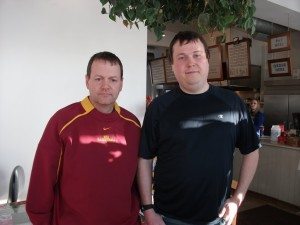A new baseball blog is on my radar.
Andrew Martin is of the most helpful members of the http://www.sportscollectors.net/ community. When I saw him share news of letters and even phone calls from retired players, I knew we spoke the same language. He’s used his autograph collecting prowess to build relationships with former players. The result is “The Baseball Historian,” a blog sharing his well-researched, finely-written profiles of names from baseball past, along with the classic stories they’re still eager to share.
Andrew offered his take on baseball history from an autograph collector’s point of view.
Q: Once, you got only autographs. Now, you’re collecting memories, getting phone calls. How?
A: I always have my mailing address, email address, and phone number on all of my letters. Additionally, I just finished a graduate program in history and did my thesis on a baseball historical topic. As a result I started putting a postscript in my letters letting the people I wrote know of my interest in baseball history and asking them if they had any interest in chatting with me for 10-15 minutes about their experiences in baseball.
I have done about 65 phone calls and I would estimate that they average about 20 minutes each. In a couple of instances, the players have continued calling me back on a regular basis and we have developed personal friendships.
In other instances I have also had players call me just because they enjoyed my letter. I found that taking my time in researching a person’s career and writing a thoughtful and detailed letter got a lot of positive responses, agreements to do interviews, and phone calls that way. A favorite example of one of my interviews was with Carl Erskine. We ended up chatting for almost an hour and was appreciative not only on my knowledge of his career, but of also knowing other things that were important to him such as the Special Olympics.
I have recorded as many of the telephone interviews as possible, with the player’s permission. I currently have the audio files on my computer, but am thinking up new ways to utilize them, such as writing/blogging and possibly putting up a website to share with others.
 |
| Andrew’s research adventures have included an encounter with ESPN Baseball Insider Buster Olney |
Q: What address sources do you use?
A: I mainly utilize the Harvey address lists and information found on http://www.sportscollectors.net/. I also do some independent research when tracking down harder to find people.
Q: What are your baseball-related autograph goals?
A: I would love to get to 50,000 autographs one day. Not because of value or impressing others, but because that would mean that I had done a ton of research and had a lot of great experiences with my requests and fellow collectors. I see autograph collecting as a lot like fishing. I put out a lot of lines, do a lot of waiting, and love the surprise of seeing what I get.
Q: Advice to new collectors?
A: Don’t be afraid to do the work or take chances. Even though other people may not have success with a person doesn’t mean the same will happen to you. Just this past week I had a success from Jim Rice and at the same time I know of other people who were getting their cards back unsigned.
Q: Would you preview what your blog might offer in coming weeks?
A: I hope to post more summaries of my interviews, write up commentaries on baseball stories and personalities; and post articles I am researching on different aspects of baseball history. Currently I am working on a piece for a magazine about a “tryout” the inventor Thomas Edison had with the Philadelphia Athletics in 1926.
I’ll stay tuned to “The Baseball Historian.” I hope you do, too. These profiled men are more than mere autograph signers. They’re links to baseball history, wanting us to keep their connections to the past alive.
Tomorrow: Who is your hobby MVP?

